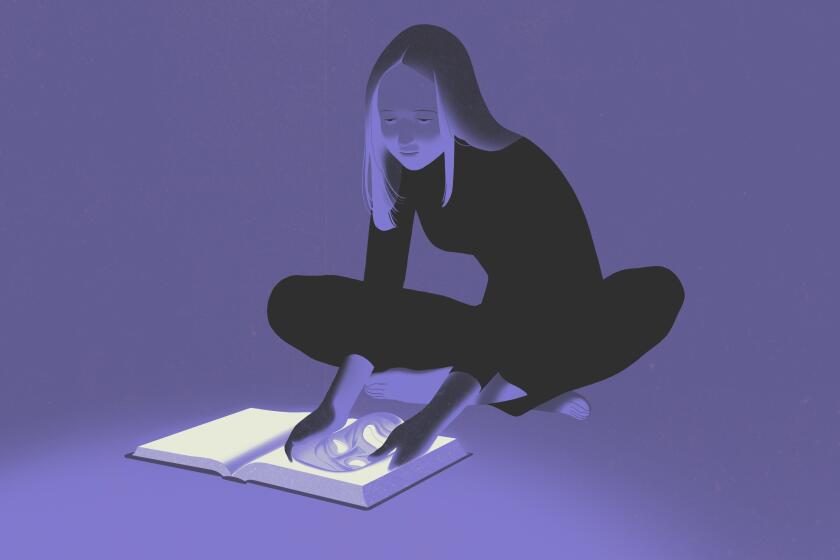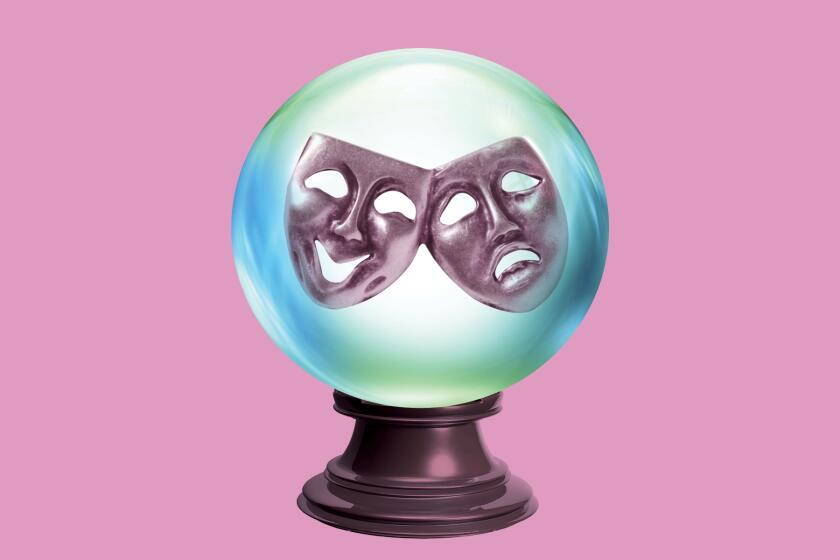Playwrights are calling out racism in theater. Their art lights a path to justice
- Share via
For the last 10 weeks, while teaching a spring quarter seminar at UCLA, I’ve been living in a more enlightened America. An America in which the politics of race and representation is rigorously interrogated. An America in which ideology isn’t allowed to triumph over human complexity and messiness. An America in which history is understood as an act of collective storytelling, subject to revision as the collective opens up to include voices previously negated.
I took refuge in this America as a pandemic, which has exposed longstanding racial disparities and injustices, upended our reality. This world that I was sojourning in was ruled by a diverse group of contemporary American playwrights who were the subject of my graduate theater course. I’m sorry to leave this exalted realm, but as Black Lives Matter uprisings are challenging the old prejudicial order, I feel better equipped for the struggle that lies ahead.
Prominent playwrights of color have joined a letter of protest entitled “We See You, White American Theater,” written to call out systemic racism in the profession. The complaints are hard-hitting. The brutal death of George Floyd, coming after so many other agonizing police killings, has revealed silence, appeasement and making nice to be a losing strategy. Much in the letter is necessary and overdue, and I hope institutions will commit to programmatic change instead of just paying the usual lip service.
Los Angeles artistic directors could begin by producing more of the work of a talented generation of dramatists that has been fearlessly rewriting the rules. Why haven’t we seen Jackie Sibblies Drury’s Pulitzer Prize-winning “Fairview” yet in our city? Why is there still such reluctance to present other groundbreaking plays by women, writers of color and LGBTQ authors at our large nonprofit theaters? It is the art of these playwrights, after all, that has the potential to rescue an angry, divided, sputtering nation.
The UCLA course, a version of the one I’ve been teaching at the California Institute of the Arts, was inspired by the renaissance in American drama that has been underway in the last decade. Straight white men, long the dominant force in the theatrical repertoire, played a decidedly lesser role. The reason has nothing to do with reverse discrimination. It’s a mathematical problem: The talent pool of dramatists is so rich, and with only so many weeks, decisions have to be made.
Young Jean Lee started us off with “Straight White Men” and “The Shipment.” From there we moved to work by Annie Baker (“Circle Mirror Transformation” and “The Flick”), Branden Jacobs-Jenkins (“Appropriate” and “An Octoroon”), Quiara Alegría Hudes (“Elliot, A Soldier’s Fugue” and “Water by the Spoonful”), Julia Cho (“Aubergine” and “Office Hour”), Drury (“Fairview”) and Jeremy O. Harris (“Slave Play”).
Amy Herzog’s “Mary Jane” and Martyna Majok’s “Cost of Living” were discussed together in the context of disability, caregiving and America’s class system. Lucas Hnath’s “A Doll’s House, Part 2” shared the bill with Ayad Akhtar’s “Disgraced” in a class examining new directions in debate drama. The course concluded with Heidi Schreck’s “What the Constitution Means to Me,” a play in which the trauma and the resilience of the American democratic experiment — recurring themes in our seminar — emerge in shattering personal testimony.
Don’t let the coronavirus outbreak obscure the lessons of theater, the connection to great thinkers, the inspiration that comes from the art of creation.
Our critical focus throughout the course was on the contested subject of identity. Attention was paid to race, gender, sexual orientation and economic caste, but the plays refused to settle into schematic categories. A larger question consumed our discussions: What does it mean to be American at this fractious moment in our history?
The mode of the class was exploratory. One of the reasons I like teaching this seminar, which has a shifting cast of writers, is that it allows me to spend time with plays that remunerate repeat encounters. In my role as a newspaper critic, I’m called upon to pronounce instantaneous verdicts. But dramatic literature at its best is an invitation to collectively engage, to pose questions not only of the work but of the minds examining it.
Our footing wasn’t primarily political. We analyzed the composition of dramatic works, probing those points where style and content are indistinguishable, for it’s here where a playwright’s distinctiveness can best be glimpsed. The act of close reading, however, doesn’t take place in a vacuum. Our experiences, sensitivities, blind spots and passions are inevitably brought to bear in that mediation between text and social world we call interpretation.
Patti LuPone, Lynn Nottage, Tarell Alvin McCraney, Young Jean Lee, Joe Mantello and others answer the question: How should theater be different?
I thanked the students at the end of the quarter for journeying with me in this study of contemporary American playwriting during what has certainly been the most tumultuous period in American life I’ve lived through. At a time of social upheaval, I hoped the work we shared would be a resource to them, as it has been for me. Although the assigned plays were written before the pandemic and the uprisings over racial injustice and police brutality, they provide invaluable navigational tools for moving into the future.
Rather than offer the empty promise of answers, these works extend the wisdom of carefully considered questions about the fabric of our society and our tricky relationship to history. They shed light on a fractured union, and for those not put off by the glare, there is the hope of reconciliation through an honest reckoning of how we’ve come undone.
Here are a few takeaways from the seminar I highlighted before ending our regular Zoom meeting for the last time.
- Our identities are inextricably bound with the cultural representations that are available to us. Identity is a function of identification, and a narrower range limits the imaginative possibilities. It’s one of the reasons so many of the playwrights are deconstructing stultifying dramatic forms, whether it’s Lee in “Straight White Men” testing the limits of the domestic drama or Jacobs-Jenkins in “An Octoroon” poking for life in hoary melodrama. New dramaturgies are called for, but to find them we must sift through the old ones to see how we have unwittingly been imprisoned in stereotypes.
- Who is deemed eligible for the protagonist role reveals a good deal about a society. In Baker’s “The Flick,” she focuses attention on the menial workers of a crumbling New England movie house, the kind of lives normally relegated to the role of extra on stage and screen. Majok has made it her mission to shine a spotlight on those immigrant employees who are treated as nameless peons in America’s cruel economy. Our assumptions about characters in drama aren’t left behind in the theater. The social scripts we follow carry many of the same prejudices.
- Who is permitted to speak often determines who controls the narrative. Harris’ “Slave Play,” a metatheatrical comedy administering “Antebellum Sexual Performance Therapy” to a group of interracial couples, builds to a cathartic explosion in which Kaneisha demands that her confidently articulate white partner listen to her story, her body, her fury, her grief. That it takes such radical drama to get to this point is a sign of just how radical the drama of American history has been.
- The white gaze is alive and well — and still largely unaware of its warping vision. In “Fairview,” Drury anatomizes the racial dynamics between the watcher and the watched in a brilliant conceptual comedy that eventually turns the tables on the audience, asking white theatergoers to come up on stage so that they can know how it feels to exist in an exhibition that nullifies their subjectivity.
- Communication occurs not simply through language but through all aspects of culture, including those schisms that separate people. As Cho movingly illustrates in “Aubergine,” food can be an eloquent repository of family memory, a shared patois of love and loss. This awareness of the limits of straightforward dialogue have propelled writers like Hudes to search for new structures in music for communal stories that speak in a variety of tongues.
If there were one point I hoped to leave my students with it is my belief that the diversity of contemporary American playwrights has helped to expand the range of theatrical forms through which we can gain a fuller understanding of our social selves. Even when the plays seem to have little interest in identity politics, the politics of identity — or what the Yale social psychologist Jennifer A. Richeson calls an “honest accounting and acknowledgement of what it has meant to be American” — is inescapable. These writers have an intuitive understanding of an insight gaining ground among political scientists that, in Richeson’s words, “the more identities people maintain — and the more complex and overlapping those identities are — the less conflict they will have with people who maintain different sets of identities.”
In fostering greater identity complexity, the American theater today is realizing more of its mimetic potential — a potential long curtailed because of the restricted access of artists on the margins. As the theater belatedly opens up, the repertoire of representations expands, creating a more extensive vocabulary and grammar for self-understanding for us all.
While thousands protested systemic racism and police brutality, American theaters remained quiet. A black producer took notes — and made them public.
More to Read
The biggest entertainment stories
Get our big stories about Hollywood, film, television, music, arts, culture and more right in your inbox as soon as they publish.
You may occasionally receive promotional content from the Los Angeles Times.













